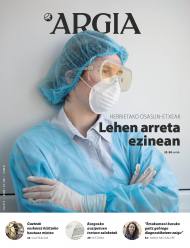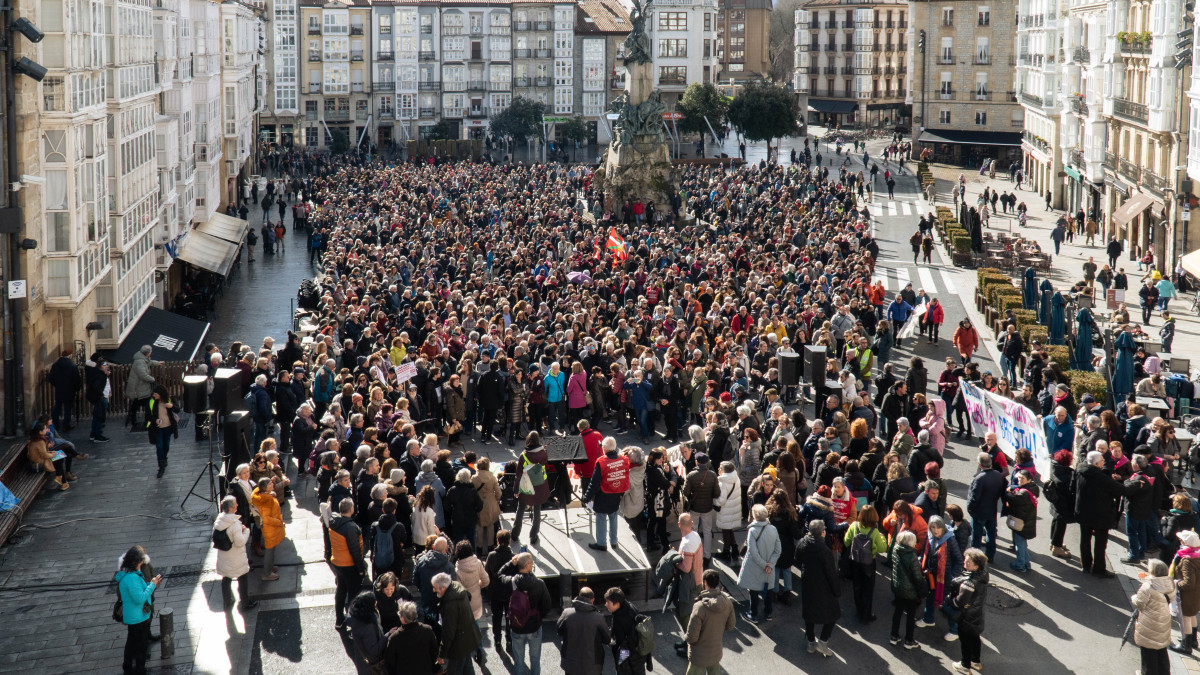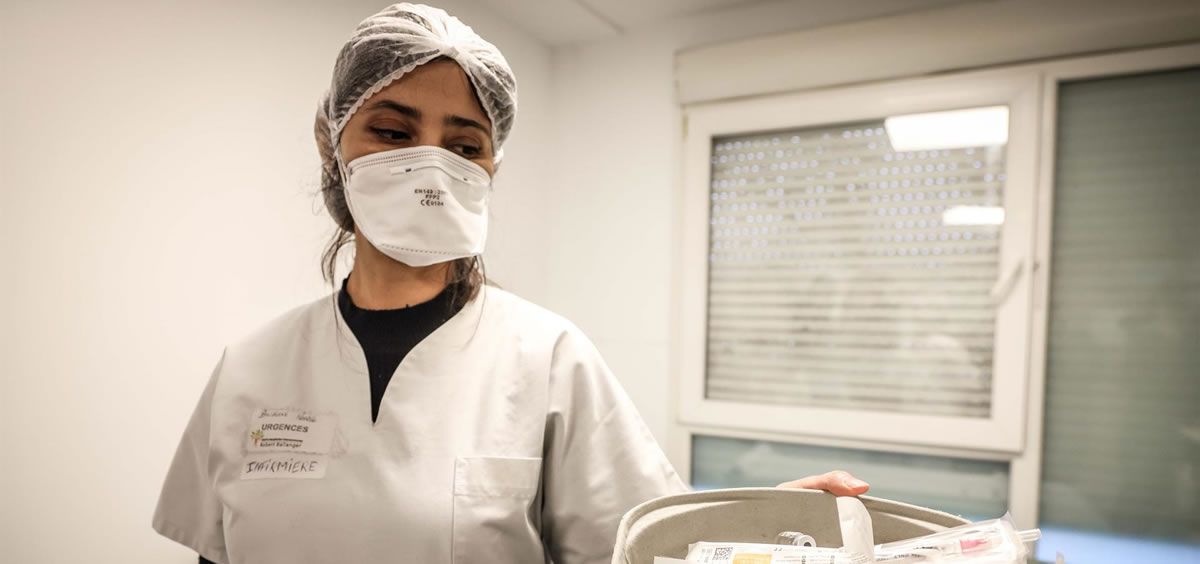The Foundation of Short Paw Healing
- Precariousness, large workloads, temporality and lack of resources place Primary Care at the forefront of the present day. It is the basis of the health system, and at a time when quality service is being demanded more than ever, it seems that neither the CAV nor Navarre have a solid foundation. We wanted to do an X-ray of the complicated situation. What has led to the anger of professionals, trade unions and citizens? What are the consequences?

Primary care is the gateway to the public health system, fundamental to disease prevention, to a strong global system and to ensure close service. These doors are closed or opened by anyone who wants to come today. Once inside, you will find the presence of professionals who cannot access all tasks, around mere waiting rooms. “In the face of any problem, citizens are asked to come to Primary Care, but they are not said to be overwhelmed and to be strengthened.” They are words of the spokesman for the Nursing Union (SATSE), Amaia Mayor. The “collapse” is the theme that speaks of the ends of the threads that make up the shell. Not to repeat last spring, professionals have demanded resources, but the work teams have not been strengthened, but have been weakened in many cases.
Many of the indications for controlling COVID-19 are primary care nurses in Álava, Bizkaia and Gipuzkoa. At first, the figure was small, as 34 nurses were “eliminated” from the health centers. However, at present there are 600 and what was a symbolic number has become a problem, since no new contracts have been made, the workload falls on the other colleagues. In addition to the usual tasks, new functions deriving from the pandemic and the annual influenza vaccination campaign must be added. However, they have fewer hands than ever before to work: “They wanted to cover two holes with the same person.”
Rubén García Pérez is a pediatrician at the Txurdinaga Health Center (Bilbao). He says that it works with a lot of work and that in 20 years he has not experienced that beginning of the course. In this sense, he has pointed out that he is doing "a lot more" than the hours he is entitled to. The phone keeps it tied in a short chain, as professionals have had to dispense with in-person care and get used to remote auditions. Two circuits have been established to avoid coronavirus in “clean” and “dirty” health centers, where patients with COVID-19 are grouped, to reduce the risk of infection of patients in the “clean” area. He says that the telephone service to get to know patients through which of these circuits they have to pass is “preventive”, but that the new situation has generated a confusing work dynamic: “‘A patient, a call’ is not a right belief: many times it does not receive you, you have to ask more questions than before to detect what the patient has. We have changed the way we work, but the coronavirus has only hit the situation in which it was already wounded.”
"Due to lack of staff, the same professionals have acted in a clean and dirty circuit" (Rebeka Ubera, EH Bildu)
Ivan Bergara is a doctor from the Health Center of Sartagudo (Navarra), and he lives in a situation similar to that of Osakidetza. It talks about uncertainty because the fact that the patient is not on the other side of the table means that a lot of information is lost when it aims to provide the best possible service as a professional. COVID-19 has only aggravated the situation: “If one of us – doctors – meets the virus, there are no substitutes and, added to uncertainty, it is a great stress to have to work like this.”
The psychologist Irune Aranguren understands the situation well. In this sense, he has pointed out that "a lot of responsibility" has been placed on doctors, nurses and, in general, on health professionals, and that it has been forgotten that they are also people. He stressed that the workload they are facing will have consequences, such as post-traumatic stress and phobias: “What happens with these pathologies is that you can do what you are doing in the moment, but in the future it can have serious consequences: blockages, not being able to go to work, not being able to care for the patient or having intrusive thoughts, among other things.”
Notorious lack of staff
The spokeswoman for EH Bildu in the Basque Government, Rebeka Ubera, coincides with what the two doctors said recently about telephone care, but also raised the face B: “Due to lack of staff in some centers, the same professionals have been present in the clean and dirty circuit.” The recruitment of more professionals from different fields has been one of the reasons why they have joined the strike called by the trade union majority in the last two months. The nursing ratio in Navarra is 7.85 per 1,000 inhabitants, while in the CAV it is 6.78. The latest ELA report stresses that most European states have better ratios: Norway (17.7) and Switzerland (17.2), among others. Below the ratios of Hego Euskal Herria are Greece (3.3), Latvia (4.6) or Spain (5.7).
Another characteristic of this crisis is the “lack of transparency”. Major, from the SATSE trade union, has acknowledged that the salaries of the Osakidetza staff are looking for a real picture, as with the official data provided by the Basque Government little can be deduced: “According to Osakidetza, there are currently 27,300 staff. On average, some 37,000 salaries are distributed per month. That is, 10,000 jobs are temporary.” Both Mayor and Ubera affirm that this is a very high amount that conditions the vital projects of the professionals and that influences the quality of the system.
"Citizens are asked to come to Primary Care for any problem, but they are not said to be overwhelmed and to be strengthened" (Amaia Mayor, SATSE)
In Navarre, professionals and social partners have also denounced the mismanagement of senior officials in the foral Community. The Navarra Health Platform has been defending a quality, public and strong system for ten years. Dabid Mendaza, a member of the platform, states that the situation in Navarre is different from that of the CAV, although, according to his own words, this is a structural problem. The Government of Navarra has strengthened the working groups, hiring more professionals, but says that the distribution was absolutely unequal: “Between March and May, almost 700 professionals were hired, but only 30 have been assigned to Primary Care. Considering that we have a total of 55 health centers, we cannot say that it is none per inhabitant”. As soon as the fall began, new recruits have been made, this time for Primary Care. However, the reinforcements have gone to the External Emergency Service and to the profile of the trackers, leaving as before the sanitary teams the first decision to applaud, very weak the second, according to Mendaza.
Looking for new ways
Prevention and promotion are pillars of Primary Care. Delving into them is the objective of the structure of the first line of the health system. In other words, promoting healthy habits in society, such as working life, or preventing economic and social situations of congestion, can be beneficial for the health system, because being an indicator of a healthy society, it would reduce the spending on healthcare: “If Primary Care were strengthened, fewer people would arrive at hospitals.” According to Dr. Pérez, it would be good to revolve around the current structure and, for example, create multidisciplinary teams for Primary Care: “Administrative, nursing assistants, physiotherapists, psychologists… Expanding Primary Care to other areas would enrich and strengthen the system”.
Nor does it seem that the interests of those who take the decisions go in that direction. Doctor Ivan Bergara has pointed out that in the media pages and in the mouths of politicians there is a constant repetition of the saturation of hospitals and the situation of workers, and less mention is made of the situation of the other structures and professionals that remain hidden. It says that this affects the citizens: Words such as “go to the emergency room, there they will look at everything” are the result of an imaginary such as this and that do nothing but underestimate Primary Care: “We are moving towards an entristic hospital system, there is nothing more than looking at the distribution of budgets to realize the reality. Investment in Primary Care has virtually disappeared.”
"Now people come directly to the pharmacy because they haven't picked up the phone at the health center, because they've given it the turn later than they would have liked..." (Lierni Mendiaraz, pharmacist)
To the detriment of prevention and promotion, the activity of Primary Care has focused almost exclusively on care. The pandemic led to the closure of numerous health centres in the name of citizen and professional security. Ubera and Mendaza remember that years ago two governments of Hego Euskal Herria tried to implement teleassistance, but failed to do so, due to pressure from opposing opinions. The member of the Navarre Health Platform says they have “taken advantage” of the COVID-19 crisis and fears that the measure will not become definitive. “The phone never replaces face-to-face attention.”
The search for the doctor's view, and the complication of the access route to the health system, have led many citizens to go to private services. To date, there are no data confirming this trend, but trade unions and professionals have perceived an “inertia”. “Taking advantage of the situation, advertising for private insurance has increased considerably and people have turned to them, probably in search of close attention,” says Dabid Mendaza. Iñaki Urizar is the center coordinator of the IMQ. They have also had to take action, reduced face-to-face consultations by 90% and multiplied phone calls by four, according to Interior. He said they have noticed that they have received more patients, but in general, people feel “waiting for the pandemic to pass,” at least in the case of non-serious pathologies.
Also, the pharmacist Lierni Mendiaraz explains that the discomfort caused by the situation has also influenced self-medication, and that, unlike before, people now go directly to the pharmacy: “It’s usually because nobody at the Health Center answers or because they’ve been given the shift later than they wanted.” The psychologist Aranguren says that these kinds of tendencies can be “normal”, as human beings “need answers” to end uncertainty.
Coronavirus is not a problem
One of the slogans that has been heard time and again during the strike days called by the unions during the fall is that COVID-19 is not the center of the problem, but an additional element that has contributed to the emergence of a structural problem that has led to the extreme patience, energy and professionalism of the workers. Ubera has put two keys on the table so as not to get lost in the mud of the conflict: on the one hand, because of a lack of planning, on the other, because of a recruitment policy. Major referred to two ideas and pointed out with one example: “The exceptional situation we are experiencing is expected to continue until May 2021. That they make nursing contracts, at least until then, right? Well, no. Under the logic of the Basque Government, such decisions do not come”. This only makes the working conditions of the workers worse and, for example, that conciliation becomes impossible for the nurses, the majority are women, a fact to be taken into account. Short-term contracts are being woven daily. This precariousness conditions the life project of each: “Some don’t have a schedule before they start working.”
"We are heading towards a system that is an entristic hospital system and that has no fissures. There is nothing else to take a look at the distribution of budgets to realize the reality." (Ivan Bergara, Sartagudo Health Center)
In Navarre, Mendaza pointed out that the focus of the problem is “similar” and that there are currently situations of very serious lack of investment. Bortziriak doctors, for example, have denounced in recent weeks the existence of vacant jobs in Cinco Villas. The position of a doctor in Lesaka has been vacant since October, with 1,200 patients without reference doctors. Five Villas agents have denounced that the Osasunbidea job has not even offered a job for the Euskera requirement. Meanwhile, patients have been shared among the rest of the professionals, but they do not know how long the situation will last.
Adding to the lack of planning, Ubera points out that transfers between the Government of Spain and the Basque Government should also be taken into account, since it is not among the competences of Lakua, for example, to manage the number of Resident Internal Doctor (MIR): “No work has been done on acquiring this competence, as has been done with other transfers. The number of seats was negotiated at the state level, but then the government here did not allocate the number of seats it could.” Dr. Rubén Pérez has pointed out that universities have also done little to prestigious Primary Health Care and for the students to be a family doctor or pediatrician, and that the increasingly specialized places have been prioritized to also strengthen the hospitales.Estos ingredients have only been able to complete the cocktail that is about to explode: as the family doctor withdraws, there are fewer and fewer substitutes, almost nothing.
Albokaltes for citizenship
The different interviewed agents insist that Primary Care is fundamental for the proper functioning of the health system. According to the ELA report, the Basque Country and Navarre have a higher ratio of doctors than the surrounding European countries: In the CAV it is 2.16 per 1,000 inhabitants and in Navarre it is 2.59 per 1,000. In the case of family doctors, however, they are a third of the professionals of Osakidetza who should have half the total to have a healthy system, according to various experts. In addition, management and nursing professionals also influence the care of patients and the conditions of physicians, and their strengthening is fundamental to cope with bureaucratic work and tele-care, among other things.
Both governments have claimed "lack of professionals" in the face of requests for strike in the Basque Country. In the case of nurses, Mayor says that “there is”, but that they work abroad, in other communities or in the private sphere. “They would come if working conditions were the right ones,” he says, an essential component for anyone, if they want to offer a dignified life. According to Pérez, five years ago it was unthinkable that there was no medical substitute, but as a result of many factors, today it is only a harsh reality.
" The assumption of ‘a patient a call’ is not correct: many times he does not take the phone, he has to ask more questions than before to know what he has..." (Rubén García, Centro de Salud Barrio Txurdinaga de Bilbao)
The albokaltes of the turbulent situation are being paid by the public, and, as the psychologist Aranguren has pointed out, there has been a considerable increase in the cases of anxiety and stress, especially fed by the pandemic, but also by the lack of answers: “For many people, Primary Care is the first step to feeling better, and seeing that this pathway is saturated increases the set of symptoms we associate with concern. I would say that cases of insomnia have increased.”
Lierni Mendiaraz is a pharmacist whose realities are close to people’s concerns and requests for advice. In their words, citizens go mainly to the pharmacy in search of tips for sleeping, controlling anxiety and strengthening defenses, but in general everything moves within the framework of COVID-19 and the rest of the diseases are abandoned. He explained that eye and skin irritations have increased greatly and that in severe cases they are channelled directly through the relationship between doctors and pharmacists, although this is an exceptional resource.
Measures taken by the authorities
The Basque Government has announced the creation of 4,000 jobs in the four years of the new legislature. Mayor has pointed out that he has been told “proudly and as if it were a significant number”, but that it is news that he has neither feet nor heads, since every year they leave the Osakidetza system about 1,000 workers, since the places announced only serve to cover those plazas.Segones the SATSE union, taking into account that the tests to cover the number of seats of two years ago would be developed recently, “These figures would only serve to maintain the system as it is, not to strengthen it.”
In search of the physician's view, or because the access path to the public health system is encysted, many citizens have opted for the private system.
The Navarre Health Platform has also accused the Government of María Chivite of "postponing once again" the strategic planning of Primary Care in Navarra. The Health Advisor of Navarra, Santos Indurain, acknowledged at the plenary session last October the difficulties to strengthen Primary Care, claiming that the lack of family doctors is a very old issue. In addition, it has announced the hiring of more administrative staff. Pending the implementation of these decisions, the members of the platform have denounced the dance of figures, the lack of planning to strengthen the working groups and the unwillingness to change the situation. The members of the platform have suggested that the attitude shown is an intentional neglect, out of fear of a system that can go towards privatization.

11 doctors in health care earn 230,000 euros each year, one of the practices 18,000 euros
This Thursday, EH Bila asked the Government of Navarre to investigate and correct this situation in the plenary session of the Parliament of Navarre. The UPN and the PP have joined the... [+]
Bi erizainetatik batek lanean eraso sexistak jasaten dituela azalerazi du Erizainen Ordenak joan den urte bukaeran egin ikerketak. 21.000 erizainek ihardetsi dute, sektore pribatu, publiko eta liberaletik. Hauetan 2.500 gizonak dira.




















.jpg)

